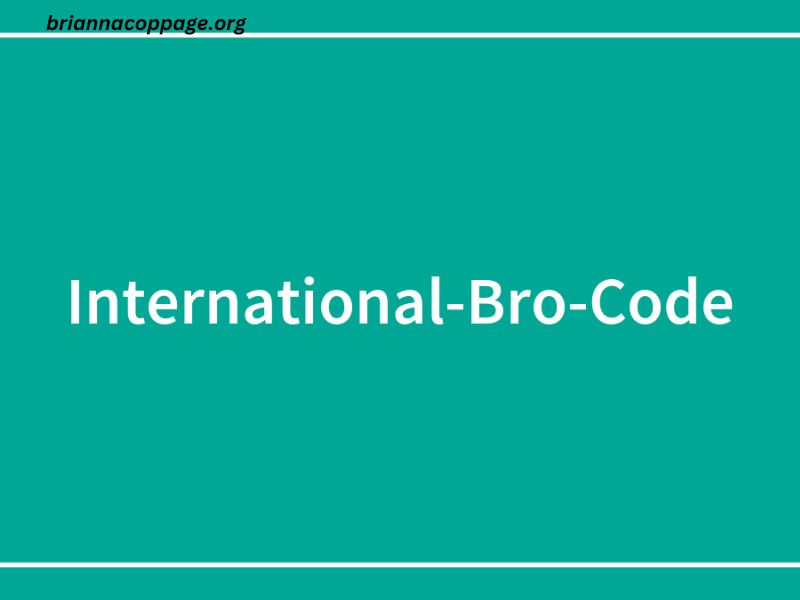The concept of “bro code” has long been a part of popular culture, especially within male friendship dynamics. In its simplest form, bro code refers to the unspoken set of rules or principles that guide the behavior of close male friends toward each other. It covers everything from loyalty to shared secrets and moral obligations. However, despite its widespread recognition and appeal in movies, TV shows, and social media, there seems to be a growing trend where people, particularly men, don’t seem to care about bro code as much as they once did. This raises an important question: Why don’t people care about bro code?
In this article, we will explore the reasons behind this shift in attitudes toward bro code, examining societal changes, modern masculinity, and evolving perceptions of friendship. Let’s break down the factors contributing to why bro code no longer holds the same significance for many people.
1. Evolving Definitions of Masculinity
Historically, bro code was closely tied to traditional notions of masculinity. The rules were built around ideals such as loyalty, silence in the face of wrongdoing, and a sense of camaraderie that many considered vital to male identity. In past decades, men were often socialized to prioritize their friendships and a “bro” above all else, including relationships with women or other social obligations.
However, the 21st century has brought with it a significant shift in how masculinity is perceived and expressed. With movements such as #MeToo and growing discussions around mental health and emotional vulnerability, the stereotypical “tough guy” image is becoming less popular. Men today are increasingly encouraged to express their emotions, engage in deeper, more meaningful relationships, and challenge traditional gender norms.
This shift has impacted how bro code is perceived. With the focus on vulnerability and emotional honesty, some men no longer feel compelled to follow an unspoken code that emphasizes loyalty above everything. For example, while bro code might dictate never dating a friend’s ex, a more emotionally aware approach could encourage a conversation with the friend about the situation instead of adhering strictly to the rules.
2. The Rise of Individualism
In recent years, the idea of individualism has gained significant traction, particularly in Western societies. While bro code once emphasized group loyalty, many modern friendships are becoming less about conformity to a set of rules and more about personal growth and autonomy. As people become more focused on self-identity, self-expression, and personal goals, the collective “bro” mentality becomes less relevant.
The rise of individualism means that people are often more concerned with their own well-being than maintaining blind loyalty to a set of rules. For instance, if a man chooses to prioritize a romantic relationship over a friendship, or chooses to break a bro code rule for personal reasons, it’s often seen as an acceptable personal decision rather than a betrayal.
In this sense, bro code is less important to people who view their friendships through a more individualistic lens. While once the code emphasized collective loyalty, today it might be more about respecting each other’s autonomy and understanding that people evolve in different directions.
3. Changing Gender Norms and Gender Dynamics
The emergence of more progressive gender norms also plays a critical role in why bro code is losing its relevance. Traditional gender roles once dictated that men should be the protectors, the “bros” who looked out for one another above all else, while women were often seen as the “other” in male friendships.
However, as society progresses toward greater gender equality, the way men view their relationships with both other men and women has shifted. Men are now far more open to platonic friendships with women, and the boundaries between male and female friendships have become more fluid. In such a dynamic, strict adherence to bro code rules that exclude women or prioritize male solidarity over cross-gender relationships no longer makes sense to many.
Additionally, the concept of bro code was traditionally defined by a sense of ownership—sometimes in relation to women, sometimes in relation to decisions made among friends. As gender equality progresses, there is less need for the exclusivity or ownership that the old bro code implied. People today are less likely to put their friendships in a “box” based on outdated stereotypes or dynamics.
4. Social Media and the Decline of Private Friendships
Social media has fundamentally changed the way we interact with our friends, including our closest ones. The digital world allows us to share our lives with a vast audience, blurring the lines between public and private spaces. This constant exposure means that friendships are no longer confined to intimate, private circles in the same way they once were.
The unspoken rules of bro code, which typically required discreetness and privacy, clash with the culture of oversharing promoted on social media. For instance, what was once considered a private conversation between two friends is now shared as a public post, tweet, or story.
Because of social media, many of the once-sacred aspects of male friendships (such as keeping certain secrets, refraining from dating a friend’s ex, or never speaking ill of each other) are now less guarded. The same people who may have adhered to bro code in a more private setting now feel pressure to display certain aspects of their lives publicly. This encourages a more “open” and less secretive version of male friendships, further diminishing the importance of bro code.
5. The Influence of Pop Culture and Changing Media Representations
Pop culture has long shaped the way we view relationships, including friendships between men. Movies and TV shows, from “The Hangover” to “Superbad,” have long depicted male friendships with an emphasis on bro code. While these portrayals once seemed to reinforce the idea of the bro code as a fun and entertaining part of male bonding, the representation of male friendships in the media has evolved.
Many modern TV shows and movies now focus on more diverse, inclusive portrayals of male friendships that highlight complexity and vulnerability. The “tough guy” or “ride or die” friendship is no longer the sole representation of male camaraderie. Instead, shows and films are focusing on male characters who break the traditional rules of bro code—whether that means dating a friend’s ex, expressing emotions, or even addressing toxic behaviors that were once normalized.
This shift in media representation mirrors societal changes and has a direct impact on how bro code is perceived. As new depictions of masculinity emerge, the idea of a rigid set of rules becomes less appealing to a broader audience. People today are more likely to connect with characters who challenge the traditional bro code, which reflects the reality of modern friendships.
6. Bro Code as a Form of Toxic Masculinity
In some cases, the disregard for bro code can be attributed to its association with toxic masculinity. Traditional bro code can sometimes be seen as enforcing unhealthy behaviors such as emotional suppression, competitive aggression, and homophobia. In this sense, bro code has long been criticized for perpetuating these negative traits among men.
For those who are rejecting the limitations of toxic masculinity, bro code no longer holds appeal. Many men are choosing to foster healthier, more emotionally open friendships that are free from the constraints of outdated rules. The refusal to adhere to bro code, in this sense, is a rejection of harmful stereotypes that demand men act in a certain way to preserve their “masculine” identity.
Conclusion
In recent years, the question of “Why don’t people care about bro code?” has become more relevant as societal attitudes toward masculinity, friendship, and gender norms evolve. While bro code once represented a vital part of male camaraderie, it is now less relevant to many men who prioritize individualism, emotional vulnerability, and inclusivity in their relationships. As culture changes and social dynamics shift, the once unshakable rules of bro code are being redefined or even abandoned altogether.
Whether it’s due to a rise in progressive masculinity, the influence of social media, or a rejection of toxic behaviors, bro code is no longer the guiding principle it once was. Instead, modern friendships are embracing greater flexibility, vulnerability, and authenticity, which reflects the changing values of today’s society.





